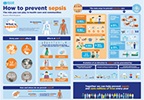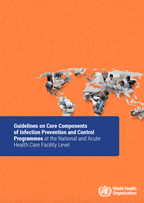
Core components for IPC
Based on scientific evidence, expert consensus and country experiences, the WHO core components for infection prevention and control (IPC) are the foundation for establishing or strengthening effective programmes at the national and facility level.
Guidelines and evidences
These new guidelines on core components of infection prevention and control (IPC) at the national and acute health care facility level will enhance the capacity of Member States to develop and implement effective technical and behaviour modifying interventions. They form a key part of WHO strategies to prevent current and future threats from infectious diseases such as Ebola, strengthen health service resilience, help combat antimicrobial resistance (AMR) and improve the overall quality of health care delivery. They are also intended to support countries in the development of their own national protocols for IPC and AMR action plans and to support health care facilities as they develop or strengthen their own approaches to IPC.
Additionally, to coincide with World Antibiotic Awareness week (WAAW) 2019, the new evidence- and expert consensus-based minimum requirements for IPC programmes were launched. The minimum requirements represent the starting point for undertaking the journey to build strong and effective IPC programmes at the national and facility level. They should be in place for all countries and health care facilities to support further progress towards full implementation of all recommendations on the WHO core components of IPC programmes.
Key publications

Decontamination and reprocessing of medical devices for health care facilities: aide-memoire
Decontamination of medical devices plays an important role in the prevention of health care-associated infections. It includes cleaning, disinfection and/or...

Transmission-based precautions for the prevention and control of infections: aide-memoire
Transmission-based precautions (TBP) are used in addition to standard precautions for patients with known or suspected infection or colonization with transmissible...

Standard precautions aim to protect both health workers and patients by reducing the risk of transmission of microorganisms from both recognized and unrecognized...
Implementation
To succeed in IPC and bring about safer, high quality health care practices, implementation at the point of care is critical. Conceiving and testing field implementation and behavioural change strategies and tools is a key part of WHO’s Infection Prevention and Control (IPC) Hub & Task Force. IPC tools and resources made available by WHO are associated with a multimodal implementation approach that integrates IPC best practices within an improved safety and organizational culture. This approach has been shown to succeed in making the change that people want to see in health care.
The below practical manuals are designed the national or facility level to achieve effective implementation of their infection prevention and control (IPC) programmes according to the World Health Organization (WHO) Guidelines on core components of IPC programmes in the context of their efforts to improve the quality and safety of health service delivery and the health outcomes of the people who access those services. The principles and guidance provided in these manuals are valid for any country, but with a special focus on settings with limited resources.

Improving infection prevention and control at the health facility: an interim practical...
Additional implementation resources
- Antimicrobial Resistance and Infection Control (ARIC) publication on Core Components of Infection Prevention and Control Programmes at the National and Acute Health Care Facility Level
- Effectiveness of national and subnational infection prevention and control interventions in high-income and upper-middle-income countries: a systematic review
- Global infection prevention and control priorities 2018-22: a call for action
- Listen to the free recording of the presentation on the Minimum Requirements for IPC programmes
- Addressing the burden of infections and antimicrobial resistance associated with health care – Focus on G7 countries
Training
A range of educational tools exist for you to adopt and adapt to support health worker training on the core components for IPC programmes.
New IPC recommendations from WHO - the importance of IPC actions in fighting AMR
Powerpoint Presentation (14 November 2016) | Audio recording
IPC training: leadership and programme management in infection prevention and control module - trainer guide
IPC training: leadership and programme management in infection prevention and control module - presentation
IPC training: leadership and programme management in infection prevention and control module - student handbook
Monitoring
Assessment tools
The following tools are available to measure and monitor progress of your IPC programme and its implementation according to the core components guidelines.
National level tool (comprehensive):
National level tool (minimum requirements only):
Facility level: Infection Prevention and Control Assessment Framework (IPCAF)
Media center














